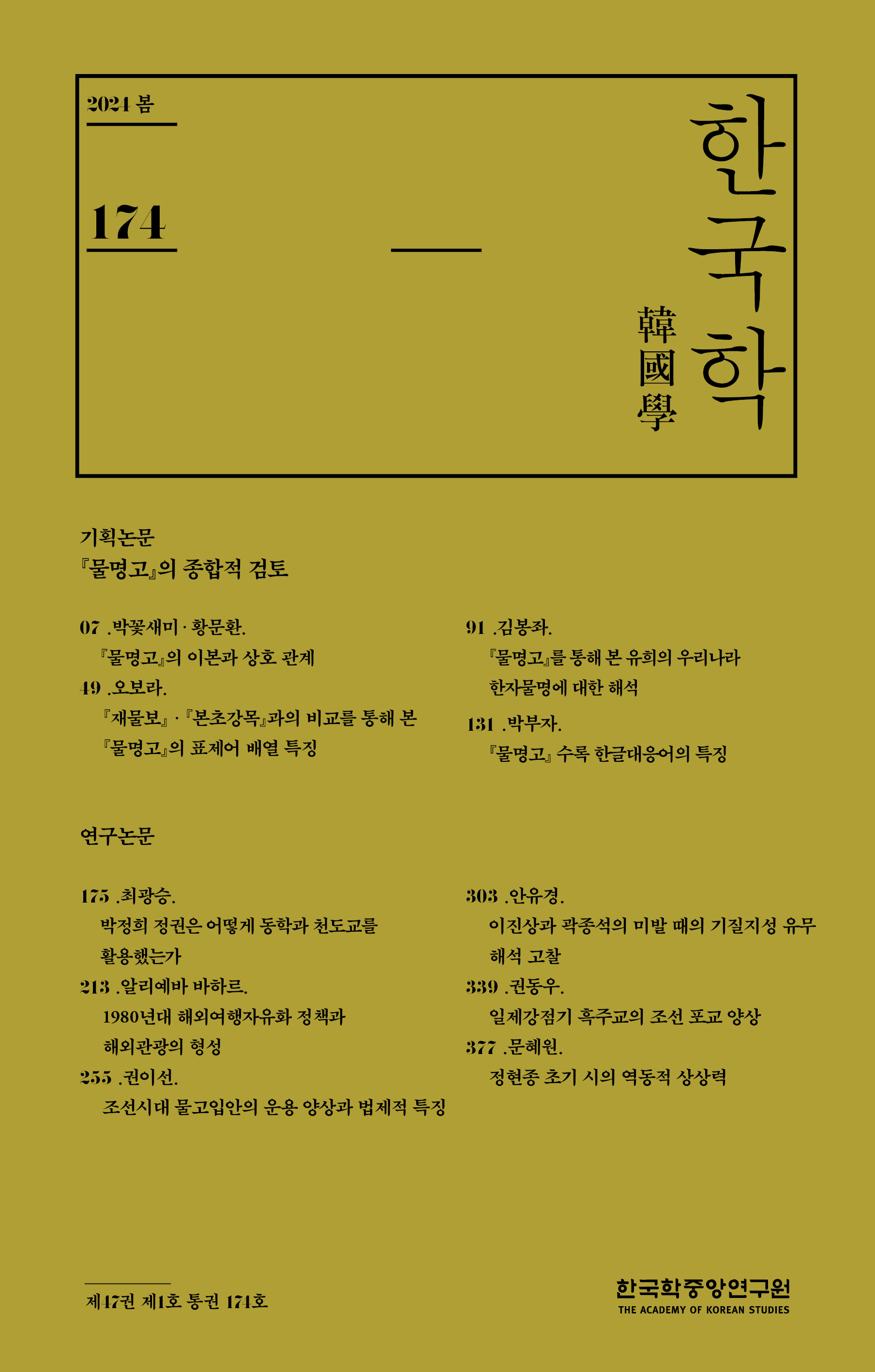
- P-ISSN 2671-8197
- E-ISSN 2733-936X
.jpg)
This study discusses the controversy related to the marriage of monks in the magazine Joseon Buddhism in the mid to late 1920s, in comparison to the preceding studies. It is possible to check their diverse voices entangled with pros and cons by examining the overall contents of contributions, breaking from the frame of pro‒Japanese and anti‒Japanese over the marriage of monks. Some who opposed the marriage of monks showed favorable attitudes to the Government General and Japanese Buddhism while others would resolve the problem of the observance of the Buddhist commandments inversely with the marriage of monks, going against their marriage. The image of the right monks they assumed was mostly something surreal, mysterious, solemn far from reality, which reminds people of the traditional Zen meditation and mountain temple life. On the other hand, those who agreed on the marriage of monks connected the issue of the marriage of monks to the socialization and popularization of Joseon Buddhism, and universal religion. In addition, they keenly point out the correlation between the marriage of monks and the violation of the Buddhist precepts that the idea of the violation of the Buddhist precepts has already been inherent in eating meat and the marriage of monks. However, among those who advocated such pros and cons, it is possible to identify the common ground that is concerned about the future of Joseon Buddhism rather than arguing the pros and cons of the marriage of monks, even though their views on future of Joseon Buddhism differed. This dissonance felt when examined from today’s historical perspective could be a phenomenon taken for granted by their eyes at the time.
朝鮮總督府, 『寺刹住持就職認可 및 本末寺法中 改定의 件』. 1926.
朝鮮總督府, 『寺刹住持就職認可 本末寺法中改正 其他에 關한 件』. 1927.
栗山泰音, 『僧侶家族論』. 東京: 櫻樹下堂, 1917.
上坂倉次, 『僧侶妻帯の諸問題』. 東京: 明治仏教研究会, 1939.
김광식, 「1926년 불교계의 대처식육론과 백용성의 건백서」. 『한국독립운동사연구』 제11집, 1997, 213‒249쪽.
마이카 아워백, 「‘친일불교’ 역사학의 재고: 조선불교단과 1920년대 조선에서의 승려결혼에 대한 논쟁」. 『아세아연구』 제51권 3호, 2008, 15‒53쪽.
박재현, 「근대 불교의 대처식육 문제에 관한 윤리적 고찰」. 『철학』 제93집, 2007, 47‒70쪽.
윤기엽, 「일제강점기 朝鮮佛敎團의 연원과 史的 변천: 조선불교단 임원진의 구성과 이력을 중심으로」. 『대동문화연구』 제97호, 2017, 293‒322쪽.
조성택, 「근대불교학과 한국 근대불교」. 『민족문화연구』 제45호, 2006, 77‒108쪽.
逸見通漢, 「即行は時期尚早ではないか」. 『朝鮮佛敎』 제27호, 1926, 18‒19쪽.
川村五峯, 「オレは寺に居る間は断じて妻帯せぬ―ドクトル渡邊海旭和尙のこと」.『朝鮮佛敎』 제29호, 1926, 25쪽.
後藤瑞嚴, 「朝鮮仏教界に及ぼす結果が注目に値せん」. 『朝鮮佛敎』 제27호, 1926, 17쪽.
佐藤稠松, 「親鸞とルーテル‒東西両教の改革と妻帯問題」. 『朝鮮佛敎』 제28호, 1926, 13‒15쪽.
中村三笑, 「朝鮮僧侶の肉食妻帯に就て」. 『朝鮮佛敎』 제27호, 1926, 2‒7쪽.
姜泰秀, 「禪敎兩宗の区別を明らかにせよ」. 『朝鮮佛敎』 제29호, 1926, 20‒21쪽.
具萬化, 「その罪三千大千世界に唾棄する處無し」. 『朝鮮佛敎』 제28호, 1926, 19쪽.
金松月, 「朝鮮仏教僧侶の破戒的運動」. 『朝鮮佛敎』 제27호, 1926, 15‒17쪽.
金連聲, 「なんと尊い問題であらうかー私は朝鮮僧侶の肉食妻帯の實現を渴望します」. 『朝鮮佛敎』 제27호, 1926, 27‒28쪽.
金連聲, 「なんと尊い問題であらうか」. 『朝鮮佛敎』 제28호, 1926, 22‒23쪽.
金連聲, 「知識人と私(ニ)」. 『朝鮮佛敎』 제39호, 1927, 24‒26쪽.
金蓮湖·朴大奎, 「彼は全鮮仏教の病毒である」. 『朝鮮佛敎』 제28호, 1926, 23‒24쪽.
釋時鏡, 「妻를 置하고 肉을 食하는 승려계에 대하여」. 『朝鮮佛敎』 제28호, 1926, 19‒20쪽.
安鍚淵,「釋尊의 嫡子로 娶妻食肉이 可乎아呀‒時代己晩이다」. 『朝鮮佛敎』 제27호, 1926, 24‒27쪽.
吳官守, 「奇怪な夭物が東亞に橫行する」. 『朝鮮佛敎』 제29호, 1926, 18‒20쪽.
兪萬兼, 「宗敎行政の立場から」. 『朝鮮佛敎』 제27호, 1926, 31‒32쪽.
英虎, 「噫、朝鮮佛敎の末路」. 『朝鮮佛敎』 제28호, 1926, 16‒18쪽.
李混惺, 「朝鮮佛教の興廢は何の関係もない」. 『朝鮮佛敎』 제27호, 1926, 13‒14쪽.
全日源, 「僧侶帶妻肉食에 對하야」. 『朝鮮佛敎』 제28호, 1926, 25‒26쪽.
澤光範, 「必要にあらず止むを得ざるなり」. 『朝鮮佛敎』 제27호, 1926, 22‒23쪽.
韓鐘秀, 「吾が佛教の大賊である」. 『朝鮮佛敎』 제29호, 1926, 20쪽.
洪鎭赫, 「朝鮮佛教の復興は耳朶的な覚醒と僧侶の人格向上に在る」. 『朝鮮佛敎』 제27호, 1926, 20‒22쪽.